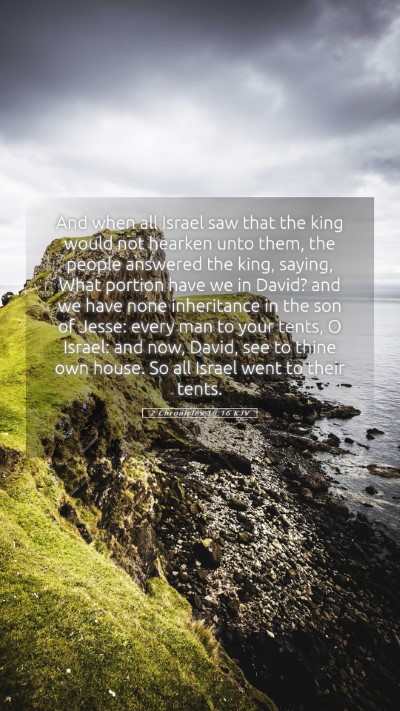Understanding 2 Chronicles 10:16
In this verse, we encounter a pivotal moment in the history of Israel as the people respond to King Rehoboam’s harsh taxation policy. This response marks a significant turning point that leads to the division of the kingdom. Below is a comprehensive analysis of the meaning and implications of this verse.
Context and Background
2 Chronicles 10 recounts the events that led to the split of the united kingdom of Israel. Rehoboam, the son of Solomon, had to decide how to govern the people after his father’s reign. The elders advised him to lighten the yoke placed upon the people, while the young advisors suggested he increase their burdens. Rehoboam's refusal to heed wise counsel led to dire consequences, as expressed in verse 16.
Bible Verse Meanings
- Rebellion against Authority: The response of the Israelites, "What portion have we in David?" indicates a rejection of Rehoboam's rule. This illustrates a profound disobedience and separation from the monarchy of David, suggesting that they felt alienated from the royal lineage.
- Desire for Autonomy: The phrase indicates a yearning for self-governance. The people sought freedom from the burdens imposed by the king, symbolizing a stand against oppression and misrule.
- Fulfillment of Prophecy: This moment also aligns with earlier prophetic declarations regarding the division of the kingdom, emphasizing that such actions were part of God's sovereign plan.
Bible Verse Interpretations
Matthew Henry, in his commentary, underscores the importance of listening to wise counsel. He suggests that Rehoboam's plight serves as a warning to leaders about the dangers of pride and stubbornness. Albert Barnes highlights the pivotal decision-making process and its catastrophic outcomes, reflecting the broader biblical principle that wisdom lies in seeking and heeding godly advice.
Adam Clarke provides insights into the historical context, noting that the people's desperate plea was justified given the heavy yoke established under Solomon. This reflection raises questions regarding the responsibilities of rulers to their subjects.
Scripture Analysis
This verse invites a critical examination of leadership dynamics in both historical and modern contexts. It prompts readers to ask questions about governance, responsibility, and the consequences of neglecting to listen to those governed.
Biblical Exegesis
By analyzing the Hebrew terms, we unearth layers of meaning surrounding the concepts of 'portion' and 'tribe.' The request implies a fundamental disruption in identity, as if to say the Israelites detest identifying with the Davidic line under such oppressive rule. It emphasizes the chasm that has formed between the monarch and the people.
Application of the Verse
This verse speaks to contemporary issues of governance, leadership, and social justice. It challenges readers to consider the impact of leadership decisions. Applying biblical insights, groups studying this passage may explore the characteristics of effective leadership, the importance of attentive listening, and the value of community in decision-making.
Relevant Cross References
- 1 Kings 12:16 - The Israelites express similar sentiments.
- 2 Samuel 20:1 - The rebellion against King David is echoed here.
- Proverbs 11:14 - Highlights the necessity of counsel in governance.
- Isaiah 30:1 - Warns against rebellious children who choose not to seek guidance.
- Galatians 6:7 - A reminder of reaping what one sows, applicable to leadership choices.
Conclusion
In conclusion, 2 Chronicles 10:16 serves as a stark reminder of the dire consequences that arise from poor leadership decisions and the rejection of sound counsel. This verse invites believers not only to reflect on historical events but to apply its timeless truths in their lives. By recognizing the significance of good governance, the importance of community voices, and the need for humility, we can learn valuable lessons for our modern context.
Further Study Resources
For those interested in digging deeper, consider using the following Bible study tools:
- Bible study guides that explore the historical context of the Old Testament.
- Online Bible study groups focused on the themes of leadership and governance.
- Bible study courses that delve into the narratives of the kings of Israel.


